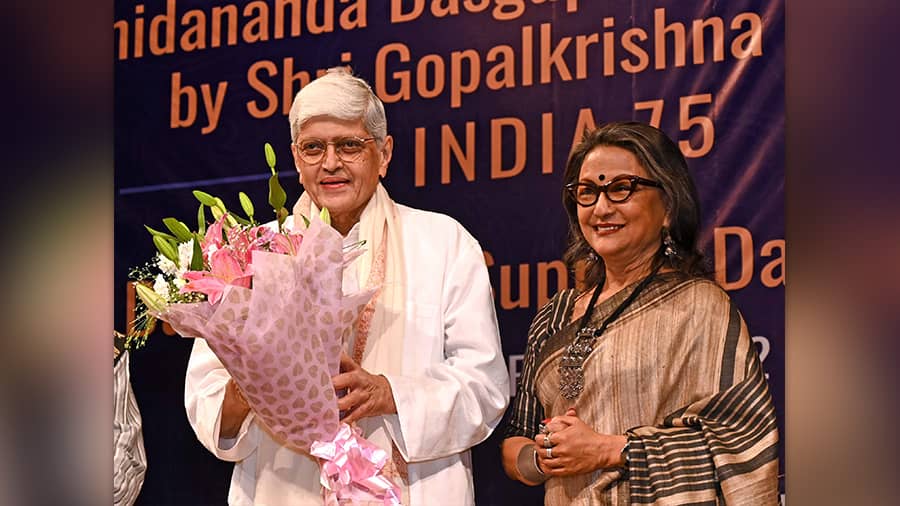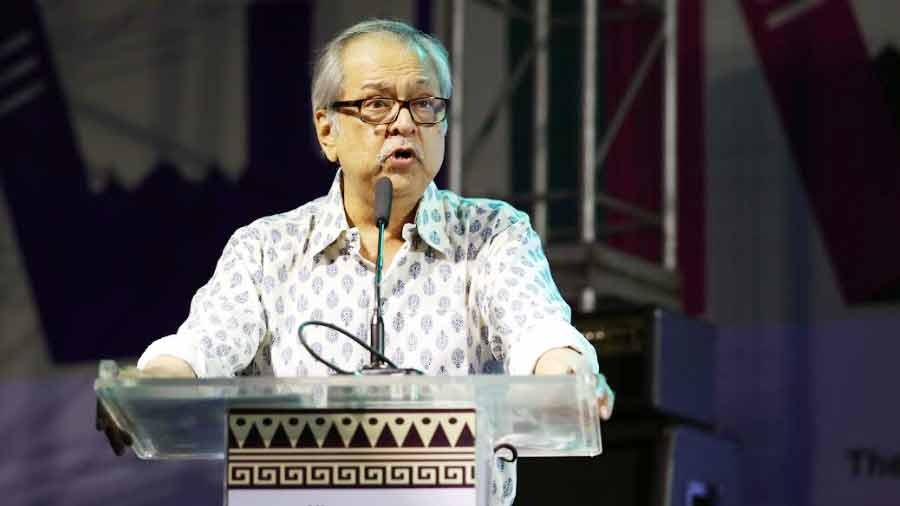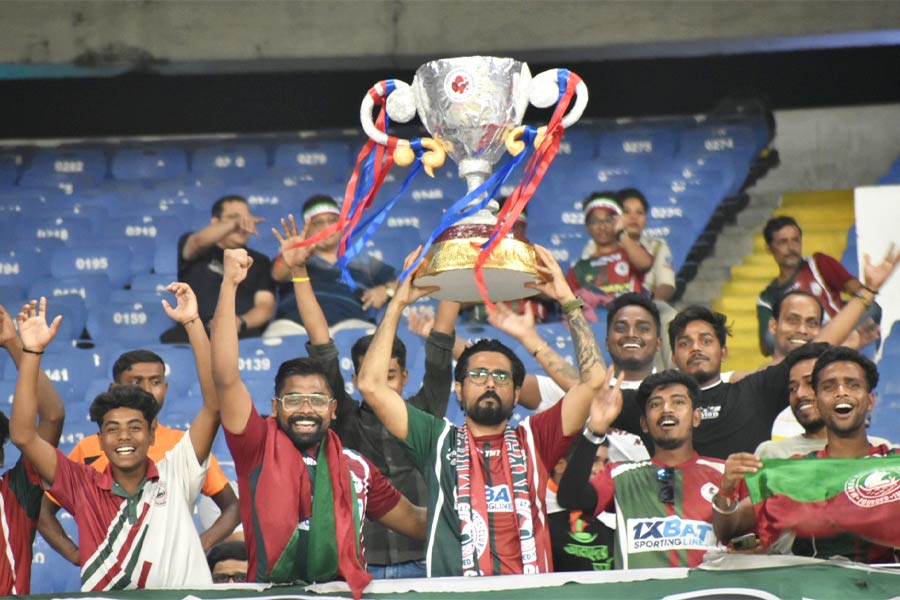Gopalkrishna Gandhi, who served as Governor of West Bengal between 2004 and 2009, is known not just for his erudition, his service to the nation or his lineage. The grandson of M.K. Gandhi and C. Rajagopalachari who has, among other diplomatic and administrative undertakings, served as India’s high commissioner to South Africa and Sri Lanka, has also been a vice-presidential candidate and currently teaches history and politics at Ashoka University.
Who better than him, then, to talk about India and its 75 years as a free, democratic nation? Gandhi delivered the second Chidananda Dasgupta Memorial Lecture, titled ‘India at 75’, at GD Birla Sabhagar recently. Organised by the Chidananda Dasgupta Memorial Trust and Sanskriti Sagar, the lecture was instituted in honour of the maker, critic and historian of films, Chidananda Dasgupta, who made masterpieces such as Amodini (which featured his daughter Aparna Sen) and founded the Calcutta Film Society with Satyajit Ray in 1947.
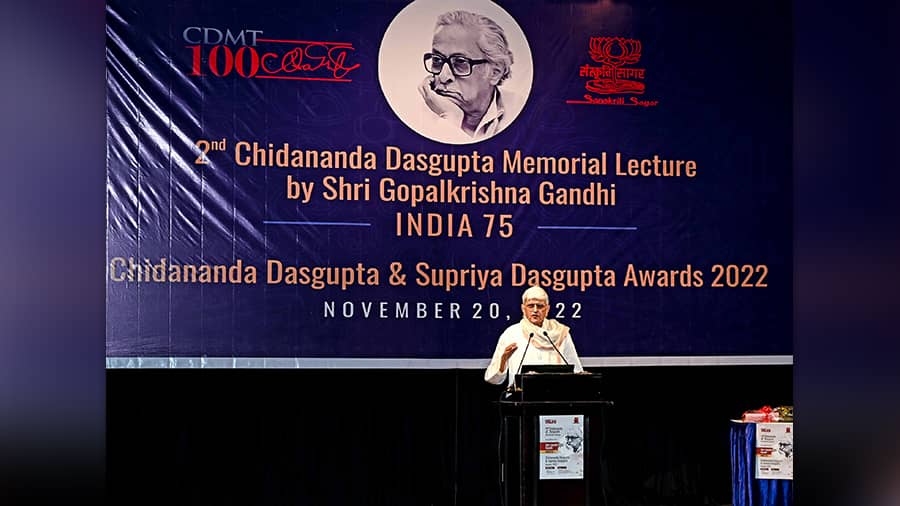
Gopalkrishna Gandhi delivers the lecture
The event, attended by eminent personalities from several walks of life, began with an awards ceremony to recognise outstanding contributions to cinema, under the categories of Best Debut Film, Best Writing on Cinema, and Best Costume Design. The last award was instituted in the name of Supriya Dasgupta, who, in her lifetime, had won several awards for her work. Manikbabur Megh, directed by Abhinandan Banerjee, won the award for Best Debut, while the award for the Best Writing on Cinema went to Srikanth Srinivasan for Modernism by Other Means: The Films of Amit Dutta. The Supriya Dasgupta Award for Best Costume Design went to Ashish Kumar for his work in Jhini Bini Chadariya (The Brittle Thread).
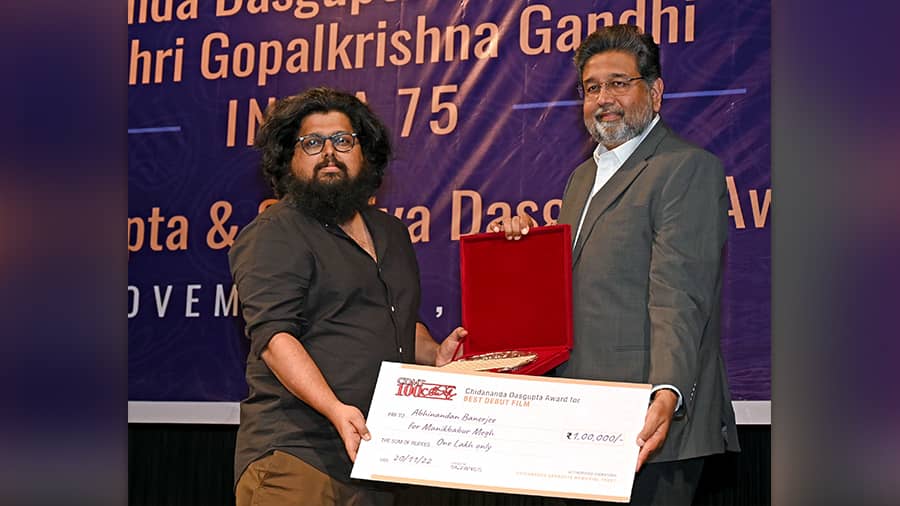
Harsh Neotia hands over the award for Best Debut Film to director Abhinandan Banerjee for ‘Manikbabur Megh’
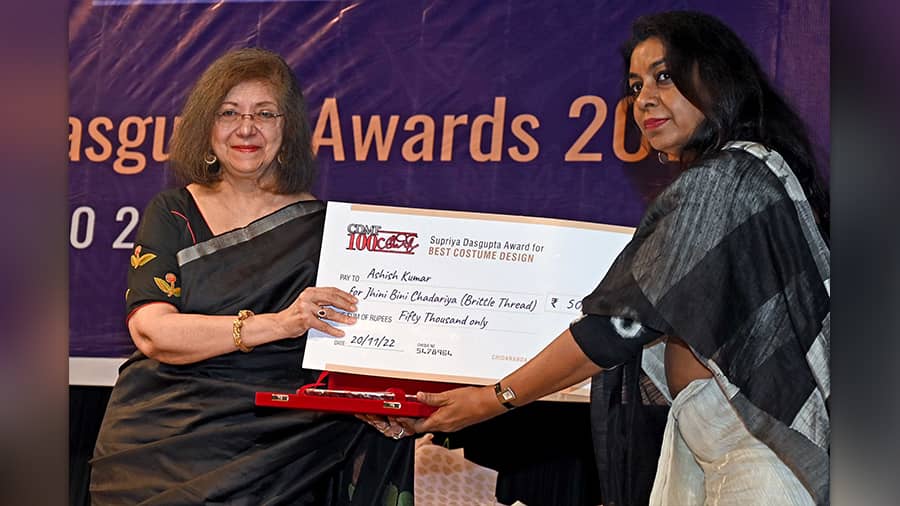
Rakhi Sarkar hands over the award for Best Costume Design to Sabarni Das, who received it on behalf of Ashish Kumar
“The people are in the dark, and the stage is lit up”
The high point of the evening was, of course, Gandhi’s lecture, which was as lyrical as it was astute, and which he delivered after being felicitated by Aparna Sen. “I offer today to Chidanandababu my tribute, and to Srimati Aparna Sen and others of his family my gratitude for this opportunity,” said the former governor, segueing into his lecture with a quip that drew laughter and applause but also aptly summarised the state of India today. “I think a great many present here in this auditorium today were born in post-Independence India. I could be wrong, as I can’t see the hall very clearly, since it is rather dark. This is very much like the state of affairs in our country, where the people are in the dark, and the stage is lit up!”
Gandhi’s lecture was replete with cautionary tales, sharp insights, anecdotes about M.K. Gandhi, H.S. Suhrawardy, Nirmal Kumar Bose, A.P.J. Abdul Kalam and others, and, most importantly, acknowledgements of India’s progress and cautionary tales about its democratic failures. He lauded the abolition of untouchability, “[owing to] Gandhi and… Babasaheb [Ambedkar],” but pointed out that the Dalit community still undergoes untold “social and economic torments”. He also mentioned India’s mass immunisation programme, the advent of mobile phones, and, of course, the Green and White Revolutions that transformed India’s ability to feed and nourish its teeming millions.
The underlying thread running through Gandhi’s thoughts brought together the notions of lateness and movement; both utterly relevant to a fledgling nation’s trajectory towards growth and progress. “Are we as a nation at 75 late for some things?” enquired Gandhi. “What can we hate ourselves for having lost or been too late for? India at 75 may have missed out on many things, but those may not all be beyond retrieval. For instance, in the last 60 years, we have lost nearly 250 languages; but some languages have been brought back from the brink, and will survive with their worlds. In our 75th year, despite a battering at the hands of the pandemic, the Indian book market has largely recovered, and is thriving.”
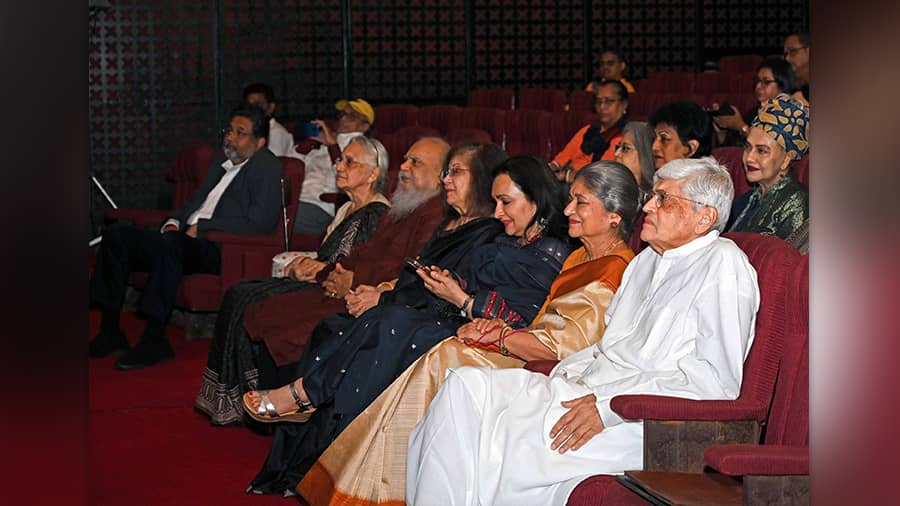
(R-L) Gopalkrishna Gandhi and Tara Gandhi with Madhu Neotia, Rakhi Sarkar, Shuvaprasanna, Uma Dasgupta and Harsh Neotia
“Wave after wave of manipulated hate”
“The Indian State has irrefutable reasons for embarking on nuclear weaponisation,” said Gandhi, in one of the most poignant segments of his talk that also dealt with climate change. “But if the State knows its duties with regard to the nation’s nuclear security, then we as Indian civil society, should know our duties about nuclear safety. We are as silent as the moon on this. Why has nothing like the Russell-Einstein Manifesto [which highlights the dangers of nuclear war] never emerged in our country?”
“India at 75 is surrounded by the New True, where fact is made to look counterfeit, and the counterfeit is made to look true,” said Gandhi, in conclusion. “The world is seeing wave after wave of manipulated hate manufactured in the name of religion, ethnicity and Otherness. It places documents like the Universal Declaration of Human Rights and the Constitution of India on a list of endangered manuscripts.” But his cautionary tale did end with a glimmer of hope: “I expect there will be more religion in politics, and politics in religion. But there will also be more people saying that this mix is poison for India.”


